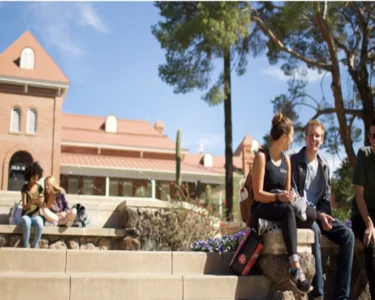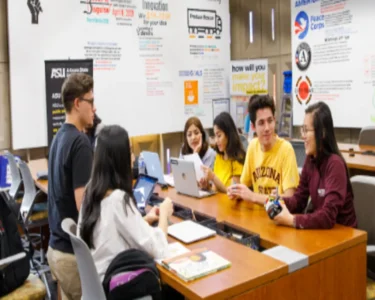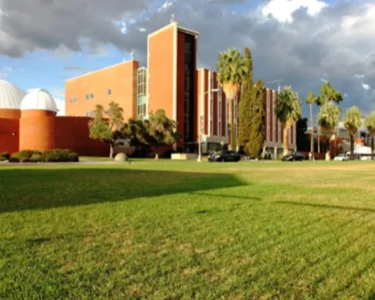Every year, Arizona University (AU) welcomes a diverse group of international students from around the world. These students arrive with dreams of academic achievement, personal growth, and new cultural experiences. However, alongside the excitement, they often face the challenge of navigating culture shock. This phenomenon, characterized by feelings of disorientation and stress when adjusting to a new cultural environment, is a common experience for many international students. This article delves into the intricacies of culture shock as experienced by international students at Arizona University, exploring its stages, impacts, and the strategies students employ to adapt and thrive.
Understanding Culture Shock
Culture shock is a multifaceted experience that can affect international students on multiple levels—emotional, cognitive, and social. It typically unfolds in four stages:
Honeymoon Stage: Initially, students are often euphoric, fascinated by the new environment and the differences they encounter. This stage is characterized by excitement and a sense of adventure.
Frustration Stage: As the novelty wears off, students may begin to feel overwhelmed by the differences in language, social norms, and daily life. Frustration, homesickness, and anxiety are common during this period.
Adjustment Stage: Gradually, students start to adjust to their new surroundings. They develop coping mechanisms, learn the local customs, and start forming connections with others.
Acceptance Stage: Finally, students reach a point where they feel more comfortable and integrated into the host culture. They retain their cultural identity while embracing aspects of the new culture.
Visit Other Locations :
. Explore the iconic Pirates of Caribbean Ride at Disney with thrilling adventures and immersive storytelling.
. Discover the ultimate guide to the Best Six Flags attractions and experiences.
The Impact of Culture Shock on International Students
Academic Challenges
One of the primary areas where culture shock manifests is in academics. International students often face significant differences in teaching styles, classroom expectations, and academic integrity standards. For instance, students from countries with a more hierarchical education system may find AU’s emphasis on critical thinking and classroom participation challenging.
Language barriers also play a crucial role. Even those with a strong command of English can struggle with academic jargon, idiomatic expressions, and fast-paced lectures. These challenges can lead to feelings of inadequacy and stress, affecting academic performance.
Social and Emotional Well-being
Social integration is another significant hurdle. The initial excitement can quickly give way to feelings of isolation and loneliness, especially when cultural norms differ significantly. For example, students from collectivist cultures may find the individualism prevalent in American society disconcerting.
Emotional well-being is often compromised as students grapple with homesickness and the pressure to succeed. The absence of familiar support systems can exacerbate feelings of vulnerability. This emotional turmoil can sometimes lead to more severe mental health issues if not addressed appropriately.
Practical Adjustments
Everyday life in a new country comes with its own set of challenges. International students must navigate everything from understanding public transportation and banking to adapting to different food and healthcare systems. These practical adjustments, while seemingly mundane, can significantly impact a student’s overall experience and sense of stability.

Coping Strategies and Support Systems
Despite the challenges, international students at Arizona University employ a variety of strategies to navigate culture shock and find success.
Institutional Support
AU provides a range of resources to support international students. Orientation programs specifically designed for international students help them acclimate to campus life. These programs often include workshops on academic expectations, cultural norms, and practical tips for living in the U.S.
The International Student Services (ISS) office is a critical resource, offering support with visa and immigration issues, cultural adjustment counseling, and social events. ISS also provides a platform for students to connect with others from their home country or region, fostering a sense of community.
Social Networks
Building a strong social network is crucial for overcoming culture shock. Many international students find solace in connecting with fellow students from their home country, forming tight-knit communities that provide emotional support and practical advice.
However, it’s equally important for students to branch out and build relationships with local students and peers from other cultures. Engaging in campus clubs, organizations, and social activities helps break down cultural barriers and fosters a more inclusive experience.
Personal Coping Mechanisms
Students develop various personal coping mechanisms to manage stress and adapt to their new environment. Maintaining regular communication with family and friends back home can provide emotional support. Some students keep journals to reflect on their experiences and emotions, which can be therapeutic.
Embracing new activities and hobbies also aids in adjustment. Whether it’s exploring local cuisine, participating in sports, or volunteering, engaging in new experiences can enhance a student’s sense of belonging and integration.
Success Stories: Thriving Amidst Challenges
Many international students not only overcome culture shock but also thrive, contributing richly to the Arizona University community.
Maya from India
Maya, an engineering student from India, initially struggled with the informal classroom culture and the expectation of active participation. However, she found support through AU’s peer mentoring program, which paired her with a senior student who guided her through academic and social challenges. Maya also joined the university’s cultural club, where she met students from diverse backgrounds. These connections helped her build confidence and improve her communication skills. Today, Maya is a student leader, actively involved in mentoring new international students.
Luis from Brazil
Luis, a business major from Brazil, faced significant homesickness and isolation during his first semester. He found solace in AU’s international student support groups, where he could share his experiences and learn from others going through similar challenges. Luis also took advantage of the university’s career services, which helped him secure an internship with a local company. This professional engagement not only enhanced his resume but also provided him with a sense of purpose and belonging.
More information:-
. Explore Shanghai Disney Resort’s magic! Discover attractions, dining, and entertainment in China’s premier Disney destination.
. Discover benefits & pricing of Disneyland Paris Annual Passes! Enjoy year-round magic with exclusive perks.
The Role of Cultural Exchange
Cultural exchange is a two-way street, and international students contribute significantly to the cultural diversity and richness of Arizona University. Their unique perspectives and experiences enrich classroom discussions, foster greater cultural understanding, and prepare all students for a globalized world.
International students often organize cultural events, festivals, and food fairs, showcasing their heritage and traditions. These events provide opportunities for the broader university community to engage with and appreciate different cultures. Such interactions break down stereotypes and build mutual respect and understanding.
Conclusion
Navigating culture shock is an integral part of the international student experience at Arizona University. While the journey can be fraught with challenges, the support systems in place, both institutional and personal, help students adapt and thrive. Through resilience and the willingness to embrace new experiences, international students not only overcome culture shock but also enrich the university community, fostering a more inclusive and globally aware campus. Their stories of adaptation and success are testaments to the strength of the human spirit and the transformative power of cultural exchange.





